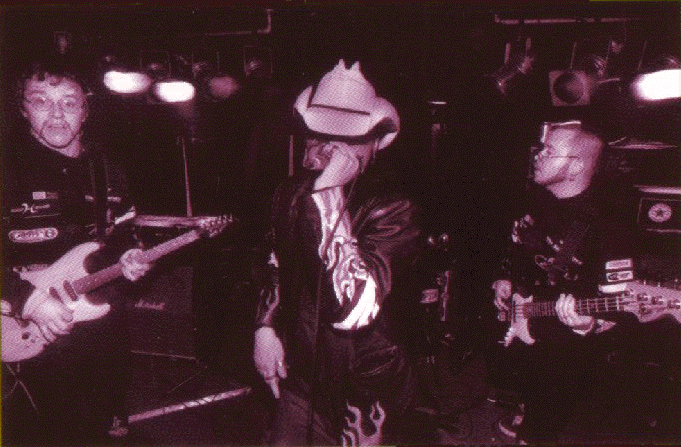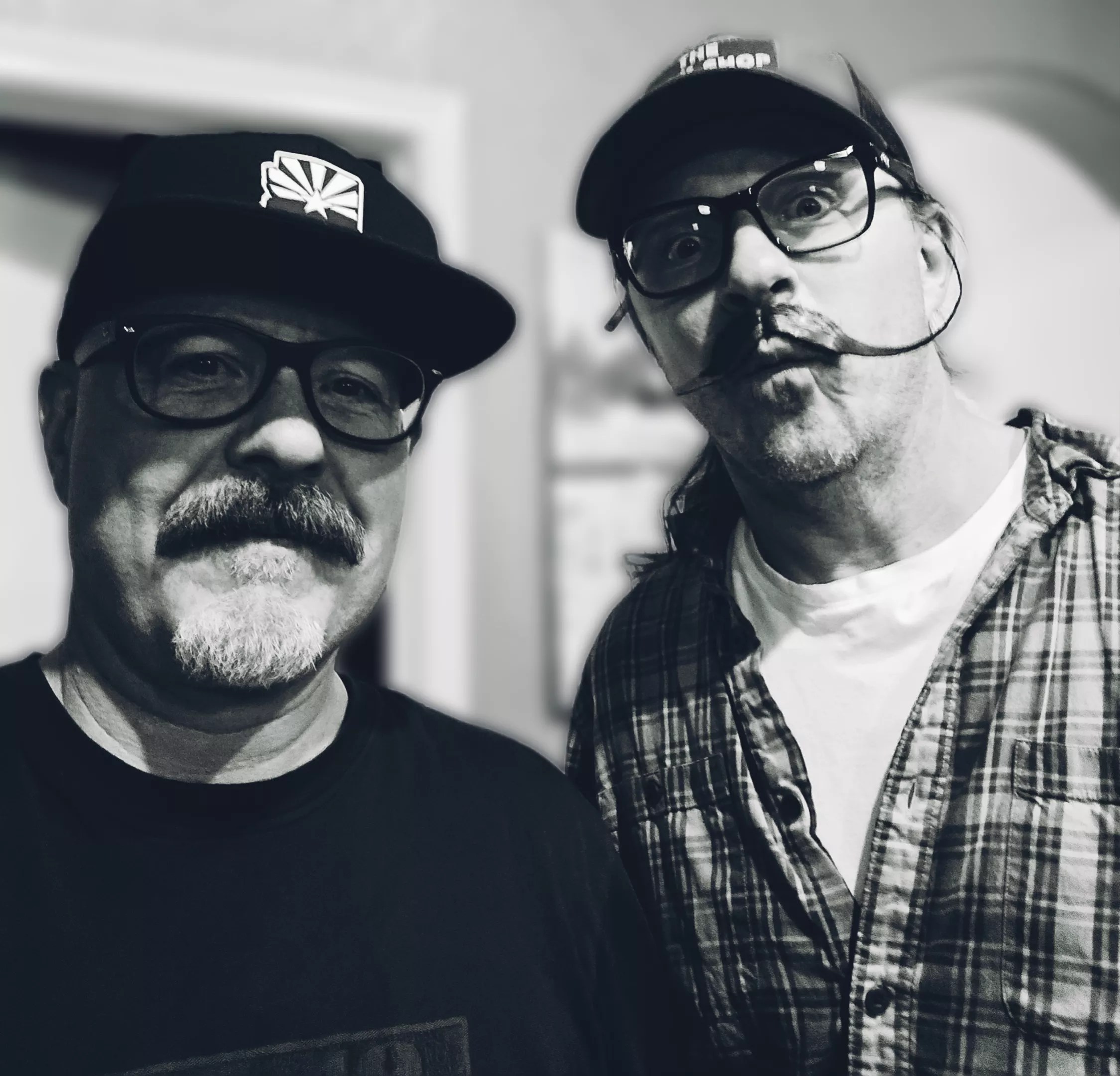
Jesus Chrysler Supercar

Audio By Carbonatix
Jesus Chrysler Supercar haven’t played in the Valley for 25 years. Back then, they routinely rocked the Green Room, a small-ish venue in downtown Tempe dwarfed by the infamous University Towers. They once opened for Warrant.
Yes, as in “She’s my cherry pie” Warrant.
“That was a fun show,” says lead singer Mitch Steele.
The Green Room may be long gone, but in an unlikely, blast-from-the-past kind of resurgence, Jesus Chrysler Supercar is a band once again.
So far in their reunion campaign, the band’s released three new singles: “Sludge/Deep Hole”, “Two Sticks (Dynamite) and “Get Out of Dodge”. Each new song has found an audience online, and it’s driven JCS further into this exciting new phase of their career.
So, how the heck can a band that has been mostly dormant for three-ish decades come back so strong? Sometimes you must look back before you can look forward once again.
If you remember Jesus Chrysler Supercar’s raucous live shows, you are most likely pushing 60 by now. The mid-’90s music scene in the Valley was vibrant and full of talented acts across the rock ‘n’ roll spectrum. There was truly something for almost everyone at venues around town, a dynamic that maintains even in today’s robust music scene. Whether it was Sacred Reich at Mason Jar, The Pistoleros at Nita’s Hideaway or Alison’s Halo at Hollywood Alley, it was all beautiful, chaotic and tons of fun.
Jesus Christ Supercar was right there in the middle of it all.
The band started out in 1993 as Jesus Chrysler, but added “Supercar” to avoid ruffling any feathers with a Tucson hardcore punk band of the same name.
“We didn’t want to be ‘those’ guys,” says Steele.
Steele and drummer Matt Collins are nothing if not passionate about their band. Back in the day, they were joined by Jason Corman on guitar (he’s returned for this current incarnation), second guitarist Jamie Hickerson and bassist Erick Smith. The OG lineup of Jesus Chrysler Supercar played anywhere and everywhere they could.
They had a similarly hectic release schedule, too, with the “Supercar” EP in 1994, “Latterday Speedway” in 1997 and “Land Speed” in 1999.
They were also touring a fair amount, too, after discovering that shows in the Midwest definitely paid better than gigs on the West Coast. Luckily for the band, Collins, who currently lives in Wisconsin, has deep roots that helped launch the band in college towns around the Great Lakes.
“We would do shows in San Diego or Hollywood, sure, but we would go to the Midwest and make $400 or $500 playing places like Bowling Green, Ohio or Saginaw, Michigan, and they would make sure you had a place to stay and a few pizzas to help you on your way,” says Steele. “We would stay at [the Collins family home] in the Milwaukee area and go play a bunch of clubs around there.”
After talking to Collins and Steele, it is immediately clear that from 1993 to 1999, JCS were living an enticing version of the local rock band dream. The two shared story after story of their exploits from those days, each one a snapshot of being young, dumb and hugely artistic in that period of remarkable change.
Here’s one such yarn. The band took their “Supercar” image and gimmick very seriously – so much so they relied on Steele’s father to really sell the whole shtick.
“A friend of his was (motor racing driver and pioneer) Bill Simpson,” says Steele. “He sent us some racing suits, which was pretty cool, and we took those suits and had them screen printed with the names and logos of people who were sponsoring us at the time.”
Those suits were coveted by many local music fans, and even other bands, throughout the ’90s. The suits clearly had some kind of influence on the crowd, and the audience would often respond in kind.
“The people who listened to us were beer drinkers,” says Collins. “They weren’t downers, you know, they were beer drinkers. People would start throwing beer during the set.”
Adds Steele, “That’s pretty accurate. Our crowd was (drinking) Miller Lite and Budweiser. You’d get wet. They’d throw beer at each other and it was fun. We had fun. The whole point was to have fun with it. My daughter loves these songs and she’s four (laughs). These songs make me happy.”
However, as with many other bands, the time came for Jesus Chrysler Supercar to call it a day before worldwide superstardom and total chart domination could come calling.
Aside from the tossed beer, however, there’s no bitterness to the JCS story. It was refreshing to hear both Collins and Steele share their tale without bashing anyone or looking anywhere for excuses. Rather, they only ever look inward as to why JCS never became anything more than a promising rock band.
“Now that you look back at it, you realize you really don’t know anything about anything,” says Collins. “I remember us thinking, ‘Oh, we are for sure going to get discovered’ because we were writing some pretty solid [songs] for the time and we were putting on decent shows. We were getting lots of local attention, but then I think we just got comfortable.”
As with many of the more popular Phoenix-area bands of that era, record labels and industry types certainly came calling. JCS had built a sturdy reputation for being a lot of fun as a live band with really catchy jams. There were instances where it seemed liked they’d be yet another band signed during the labels’ shared pursuit of the “Tempe sound.”
Still, the universe had other ideas. In 1999, a tour went haywire following some questionable decisions by booking agents. The band immediately returned home and Corman let Steele know that JCS was officially done and over. It was a wake up call, for sure, and one that created a void in Steele’s life that was not so easily filled.
“My parents moved up to Las Vegas and I went with them,” says Steele. “I was almost 30, and after the band broke up, I really didn’t have a plan B. I had a few friends up there and learned that there are a lot of ways to get in trouble up there. I kind of became a complete idiot.”
The other members, however, fared a little better. Collins earned a masters degree in international business from the Thunderbird School of Global Management. Corman, meanwhile, still works at Queen Creek’s highly touted The Pork Shop. It was up to Steele to right his own ship and build a life for himself. That started, ironically enough, with a sweet contracting job for Chrysler automotive.
The three musicians have also stayed busy in other, more meaningful ways. Steele plays in Gladhammer, and Corman is a member of Mr. Fanstastical. However, over the last ten years, Steele and Corman have gotten hooked up regularly to work on new Jesus Chrysler Supercar material. These efforts have come to fruition in a major way thus far.

Mitch Steele (left) and Jason Corman of Jesus Chrysler Supercar have been cranking out new music.
Mitch Steele
Of the previously released singles, each one feels sonically and aesthetically similar to “Land Speed” standouts like “Jillbilly” and “Swampfoot.” It’s not just that JCS have simply recaptured some lost magic; it’s that they’re doing music in a way that still satisfies them personally even after decades apart.
“This is one of the best experiences I’ve had in writing music,” says Steele. “Jason (Corman) and I have tracked stuff at his house, with Jason playing all the guitars and stuff. Going through this process has just felt so…right. Jason said, ‘This stuff sounds like we went from (“Land Speed”) recording sessions to this one. They should be on the same record.’ It sounds like we just continued where we left off and that’s exactly what was missing…it’s exactly what I wanted to do.”
Collins and Steele went on to say that the three of them plan to release a new single every few months for the rest of 2025. Collins plans to track three new songs at the end of February, so JCS fans should be ready for another release in the coming months. JCS don’t have any firm plans for reunion shows (but that could always change). Instead, they see this new “phase” as being entirely distinct.
“At 55, I’d have a coronary after five minutes [on stage] I am sure,” wrote Collins in an email to Phoenix New Times. “But though we haven’t seen each other in person for over two decades, we came together to continue to write and record new music. Now that we are older, our outlook and purpose vis a vis music has changed dramatically. We have no machinations beyond wanting to share our music and continue to have a creative outlet. We took a big swing in the 1990s and gave it our all.”
So, do the band members think it was all worth it? Are they happy to be that group who tore up the Green Room only to leave it all behind in their glory days and return only once they’d found themselves? Sure, because at the end of the day, JCS are doing exactly what they want: making music they want to hear in the world.
“It just feels a little bit like redemption,” says Steele. “I’m super happy with how things are coming out.”